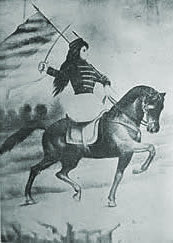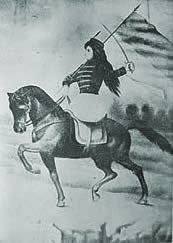
|
Women and Independence in Latin America An exploration of women's involvement in the Latin American Wars of Independence |

|

|
Women and Independence in Latin America An exploration of women's involvement in the Latin American Wars of Independence |

|
Click on the image below to see the full-size image
 Tertulia |
Gender:Male
Ethnic origen: White
Events:
| 1766 | - | Popayán | - | Not applicable | - | He was born here in 1766. |
| 1809 | - | Colombia | - | Patriot | - | He asked the Viceroy to respect Creole rights. |
| 1816 | - | Bogotá | - | Patriot | - | He was executed here in 1816. |
| 1816 | - | Bogotá | - | Patriot | - | He studied and lived here. |
Connections:
Alvarez family (Bogotá)Biography:
The son of Teresa Tenorio y Carvajal and Jerónimo Francisco de Torres, and nephew of Josefa Tenorio and cousin of Joaquín Caicedo y Cuero. (Monsalve, 165)
He was born in Popayán in 1766, and graduated as a lawyer in Bogotá. He married Francisca Prieto. In 1808 they hosted pro-independence meetings. He was a radical politician who attended meetings of the literary circle El Buen Gusto hosted by Manuela Sanz de Santamaría de González. (Cherpak, 220, Monsalve, 24, 36.)
He took part in the political processes during the Patria Boba, (1810-1819). In 1809, he asked Viceroy Amar y Borbón for a junta to recognise the needs of the Neogranadians and the rights that creoles had respecting the Spanish government. In 1812 he was president of the Congress that met at Villa de Leyva, Boyocá. In 1814 he threw an energetic proclamation to Venezuelans in favour of independence. He was executed with other patriots in the Plaza de Bolívar, Bogotá in 1816. His body was exhibited to serve as a deterrent to other creoles. His most memorable work is said to be Memorial de Agravios. He also wrote Motivos que han obligado al nuevo Reino de Granada a resumir los derechos de su Soberanía. (Ardila, 16-17.)
He read Feijóo. (Rodríguez, 37)
He is described by Lynch as a federalist who was pro-Bolívar, but anti Nariño. "His Memorial de agravios became a classical statement of colonial grievances." (Lynch, xxiii)
Accounts of his execution vary: Ardila claims he was shot. (Ardila, 16-17) Monsalve writes that he was hung. (Monsalve, 24) He clarifies that Torres was shot, then hung, beheaded and his head displayed in La Sabana railway station. (Monsalve, 167)
He wrote to his wife during his imprisonment. An extract is repeated below. (Monsalve, 166)
Part of the González Manrique, Alvarez, Ricaurte, París, Pardo, Nariño clan through his marriage. (Monsalve, 139)
References:
Lavrin, Asunción (editor). (1978) Latin American Women: Historical Perspectives; Contributions in Women's Studies, No.3.
Ardila A, Hector M. (1984) Hombres y letras de Colombia
Davies, Catherine, Brewster, Claire and Owen, Hilary (2006) South American Independence. Gender, Politics, Text
Lynch, John (1986) The Spanish American Revolutions 1808-1826
Monsalve, José D (1926) Mujeres de la independencia
Rodríguez O., Jaime E. (1998) The Independence of Spanish America